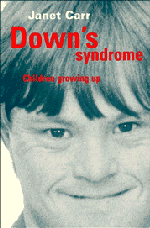Book contents
- Frontmatter
- Contents
- Acknowledgements
- 1 Down's syndrome – implications of the diagnosis
- 2 Populations and procedures
- 3 The developmental study
- 4 Self-care and independence
- 5 Behaviour and discipline
- 6 Focusing on the individual
- 7 Effect on the families
- 8 Help from services
- 9 Summary and conclusions
- References
- Index
8 - Help from services
Published online by Cambridge University Press: 06 July 2010
- Frontmatter
- Contents
- Acknowledgements
- 1 Down's syndrome – implications of the diagnosis
- 2 Populations and procedures
- 3 The developmental study
- 4 Self-care and independence
- 5 Behaviour and discipline
- 6 Focusing on the individual
- 7 Effect on the families
- 8 Help from services
- 9 Summary and conclusions
- References
- Index
Summary
Resilient and resourceful as the families with a child with Down's syndrome are, they do carry a disabled member and they do have special needs. A variety of services exist in this country, as in most developed countries, to meet these needs, but it is a topic of continuous debate as to how far the needs are met and what else should be done. We asked the mothers about their experiences of a range of medical, educational, financial and social services, which ones they had received and what they had thought of them. Some services, such as those from family doctors and health visitors, had been available from the beginning, while others had become available or appropriate only as the children grew older.
Continuing services
Family doctors
An important potential source of help, on hand since the babies' earliest days, is the family doctor. Later, families would learn about other agencies but at first they naturally turned to their GP. At 4, 11 and 21 years we asked how satisfied they had been with their contacts with him or her (see Table 8.1). When the children were 4 years old more than half the mothers had found their family doctor helpful, in that he or she came to see the child and, in many cases, took a special interest in him or her. At 11 years and again at 21 over 70% were happy with their GP, the large majority of these (80%) saying they were very satisfied.
- Type
- Chapter
- Information
- Down's SyndromeChildren Growing Up, pp. 150 - 165Publisher: Cambridge University PressPrint publication year: 1995



